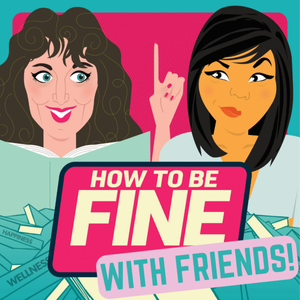
Health Care, Flooring & Easy Sustainable Living Tips - SLP 107
07/26/17 • 60 min
We're back with some EASY sustainable tips from our listeners today!
A personal storyBut before we get into them, Marianne shares a personal story about an issue she's been going through regarding health care.
Virtually all of us have experienced a health scare, at one time or another. We get stressed and so do our loved ones. But too often that stress is exacerbated by insurance and health care professionals laboring under a system that is NOT heart centered.
Many of us can relate to Marianne's frustration - a feeling that is not very conducive to healing. But we keep moving forward, with an eye toward creating new systems that have compassion and the benefit of human kind as the goal.
When it rains it pours!Marianne also needed to get new flooring for her bathroom and, being the dedicated sustainable living geek that she is, she went on a quest to find sustainable flooring. What she learned really surprised me.
Did you know that linoleum is a pretty sustainable source for flooring? I didn't!
Marianne chose linoleum for her bathroom floor and she outlines why in our discussion. But getting it wasn't as easy as you might think. These days many flooring stores are selling vinyl flooring instead and vinyl has a lot of un-sustainable issues. Marianne recounts her experience of being told a particular material was linoleum, when it turned out to be vinyl.
EASY sustainable living tipsOn our path to becoming completely zero-waste, the road is littered with packaging.
As dedicated sustainable living geeks, we want to reduce that packaging as much as possible. These tips from listeners like you, will help. We cover the importance of reducing packaging; different ways to reuse packaging; and, of course, ways to eliminate it.
Many of these tips are centered around food packaging. And two big ways to reduce it that also enhance life in many ways, are growing your own food and cooking at home. There's something very special about both of these practices that often makes for a much happier, healthier and more satisfying life.
Please let us know what you liked about this episode and what topics you think we should cover in the future. And please, keep those awesome sustainable living tips coming!
We're back with some EASY sustainable tips from our listeners today!
A personal storyBut before we get into them, Marianne shares a personal story about an issue she's been going through regarding health care.
Virtually all of us have experienced a health scare, at one time or another. We get stressed and so do our loved ones. But too often that stress is exacerbated by insurance and health care professionals laboring under a system that is NOT heart centered.
Many of us can relate to Marianne's frustration - a feeling that is not very conducive to healing. But we keep moving forward, with an eye toward creating new systems that have compassion and the benefit of human kind as the goal.
When it rains it pours!Marianne also needed to get new flooring for her bathroom and, being the dedicated sustainable living geek that she is, she went on a quest to find sustainable flooring. What she learned really surprised me.
Did you know that linoleum is a pretty sustainable source for flooring? I didn't!
Marianne chose linoleum for her bathroom floor and she outlines why in our discussion. But getting it wasn't as easy as you might think. These days many flooring stores are selling vinyl flooring instead and vinyl has a lot of un-sustainable issues. Marianne recounts her experience of being told a particular material was linoleum, when it turned out to be vinyl.
EASY sustainable living tipsOn our path to becoming completely zero-waste, the road is littered with packaging.
As dedicated sustainable living geeks, we want to reduce that packaging as much as possible. These tips from listeners like you, will help. We cover the importance of reducing packaging; different ways to reuse packaging; and, of course, ways to eliminate it.
Many of these tips are centered around food packaging. And two big ways to reduce it that also enhance life in many ways, are growing your own food and cooking at home. There's something very special about both of these practices that often makes for a much happier, healthier and more satisfying life.
Please let us know what you liked about this episode and what topics you think we should cover in the future. And please, keep those awesome sustainable living tips coming!
Previous Episode

Rise of Small, Sustainable Farms - SLP 106
Episode 106
The future of humanity may very well rest on the success of the small, sustainable farm.
If that sounds like a severe exaggeration to you, consider the following:
- Industrial agriculture uses excessive amounts of chemical pesticides, herbicides and hormones that end up in what we eat, drink and breathe
- Factory farms and industrial slaughterhouses often create unsanitary conditions that cause food contamination, sickening 76 million people in the U.S. yearly.
- Topsoil erosion and aquifer depletion caused by industrial agriculture undermines genetic diversity, and pollutes air, water, and soil with toxic chemicals, causing $34.7 billion in environmental damage annually in the U.S. alone.
- Management of animal waste at factory farms often contaminates nearby soil and water with pathogens, heavy metals, and excess nutrients that can sicken neighboring residents.
- Industrial agriculture contaminates ground and surface water with toxic pesticide and fertilizer runoff, hormone and antibiotics residue, heavy metals and harmful pathogens.
- Industrial farming often results in dead soil due to extensive plowing, constant planting and reliance on toxic chemical pesticides and fertilizers.
- Routine use of toxic pesticides by industrial agriculture pollutes air, soil and water, and damages human health.
- Antibiotics regularly fed to industrially raised animals to promote growth and keep them alive in unsanitary conditions contributes to the creation of antibiotic resistant bacteria, an increasing threat to human health.
- Hormones routinely fed to livestock in factory farms have been linked to illness in animals and humans.
- Genetically engineered monoculture crop systems favored by industrial farms drain nutrients from the land, allow pests and disease to flourish and undermine genetic diversity.
- Large amounts of fossil fuel are required to plow fields, transport foods over long distances, and produce fertilizers on industrial farms.
- Factory farmed animals are subjected to cruel and unsanitary conditions that cause widespread disease and aggressive behavior.
- Factory farms hire as few workers as possible and do little to support the local economy.
- Industrial and factory farm workers often endure unhealthy and dangerous working conditions for unlivable wages and are denied access to unions, overtime pay, safety training and worker compensation.
It's clear that damage done to humans, animals and Mother Earth by industrial farming is massive and if left unchecked, could spell disaster for all three.
But small, sustainable farmers are changing this paradigm.
In her book "Why We Farm: Stories of Farmers from the Capay Valley" Elvira Di'Brigit shares accounts of small farmers drawn to a Northern California community to grow food as serious "stewards of the land."
In this episode of the podcast, Elvira and I discuss how these amazing farmers have found success using sustainable growing techniques and non-traditional business models that connect them directly to consumers.
Farming is hard work and small farmers face many obstacles not shared by their industrial counterparts. But these folks revel in it and enjoy their lives in the Capay Valley.
It makes me wonder why. Is it the joy of using their ingenuity to solve problems in novel ways? Is it the satisfaction of knowing their work is helping to heal people and the planet? Or is it just the peaceful, bucolic life in the Capay Valley? Perhaps all three.
If you'd like to learn more about these fascinating farmers, you can pre-order Elvira's book here.
You can follow Elvira's work and connect with her online at the following sites:
Next Episode

66 And In Amazing Health SLP_108
Candida van Rood aka Candy Spender has become a friend via social media and now even more so through this podcast. We connected through expressing strong feelings about how to mother children and found so much more common ground.
- Our fathers fought in the second World War and were prisoners of war.
- We grew up with a resource aware attitude.
- We are both Geminis
- We feel that children deserve a village to raise them.
- We read many of the same books.
- Permaculture
- and so much more
I
f you want to reach Candy, visit our website for contact info
How to reach us:
Website: Sustainable Living Podcast
We appreciate your support! You can do so on Patreon.
Here is how. Go to the Patreon Homepage. Create an account. You will need a name (can be an avatar), an email address, a password and a credit card. This should only take a few minutes. Then look for us and pledge away. Thank you!
Join our Facebook group Sustainable Living Tips, Tools and Tactics.
Apple Podcasts: Please Rate, Review and Subscribe
If you like this episode you’ll love
Episode Comments
Generate a badge
Get a badge for your website that links back to this episode
<a href="https://goodpods.com/podcasts/the-sustainable-living-podcast-39317/health-care-flooring-and-easy-sustainable-living-tips-slp-107-1715434"> <img src="https://storage.googleapis.com/goodpods-images-bucket/badges/generic-badge-1.svg" alt="listen to health care, flooring & easy sustainable living tips - slp 107 on goodpods" style="width: 225px" /> </a>
Copy




